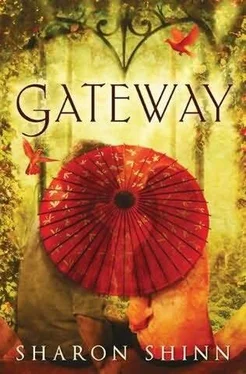“Yes, and I saw you,” she said, then winced at the inanity of her reply.
“Oh! There were so many people there! No time to get to know each other,” Xiang said. “This is much better for real friends to talk. Quan, I am so glad you can join us.”
They moved to a dining room that Daiyu had not been in before. This was a much bigger space, obviously designed to accommodate large numbers of guests, though today it was divided into a more intimate configuration by the placement of several painted screens. The rest of the décor was similarly opulent-velvet chairs, fussy wall sconces, an arboretum of plants, and half a dozen small jade statues on pedestals scattered around the room.
The rectangular table had been set with three places, but servants were even now ostentatiously laying a fourth place-to make it very clear that Quan had not been expected. Another servant came in, bowed to Xiang, and unobtrusively removed a black jade figurine of a bearded man.
Daiyu widened her eyes and did a quick count. Now there were five statues and four live people in the room. Nine individuals to sit at the meal. She tilted her head down and did her best to keep from smiling.
“Please, everybody, sit,” Xiang said, waving her hand. “Mei, you must try this chair! I just bought it and I cannot decide. Do you think it is comfortable enough to keep? Is it perhaps too bright in color? I need someone who has good taste to advise me.”
This little charade, of course, meant that Mei would be granted the best seat at the table. Daiyu hung back as Xiang carelessly directed Quan to his place-“Why don’t you sit there?”-then took her own chair. The empty spot belonged to Daiyu. She had been unable to decide if it would be better to be seated next to Quan, where she would be forced to speak to him, or across from him, where he might have ample opportunity to stare at her. It looked like the matriarchs wanted them to talk. Still keeping her eyes modestly lowered, she slipped into the seat beside him.
At first, there was no opportunity for conversation. Course after course was brought to the table, and all anyone remarked on between bites was the deliciousness of the food. Even by Xiang’s gourmet standards, Daiyu had to agree, the meal was outstanding.
Not until they were sipping tea and nibbling on a chocolate confection did the foursome have a chance to resolve into couples. “Xiang! Did you hear what that awful Lanfen said to me?” Mei demanded.
“Tell me,” Xiang replied, her black eyes already alight with malice. “Though I can believe that she would say anything.”
The older women turned their shoulders toward the other two and leaned forward to exchange low-voiced gossip. Of course, they would be able to audit anything Quan and Daiyu might find to talk about, but it was clear they were urging the younger two to try to make conversation.
Daiyu knew better than to speak first. She blew on her tea to cool it and took another sip. Part of her was fighting down a disastrous desire to giggle. That Xiang would truly be matchmaking for her false niece! That Mei’s son might actually show an interest in her! It was so calamitous it could only be funny.
“I understand you are a visitor to Shenglang,” Quan said at last.
She was not going to make this easy for him. Maybe he would decide she was rude and tell his mother he was not interested in pursuing her. “Yes.”
“Where do you normally live?”
“With my parents in the northwestern provinces.”
“It is much better in Shenglang, don’t you think?”
“Much better,” she replied.
There was a little silence.
“I have traveled to other parts of the world,” Quan announced.
For a moment Daiyu was startled. Most of the inhabitants of Jia she had encountered so far seemed to believe Shenglang was the only part of this planet that actually mattered. She had started to think there were no other continents or cities. “Really? Where did you go?”
He reeled off a few names and when, just to keep the conversation from becoming impossibly awkward, she asked a few questions, he willingly responded with expanded detail. From what she could piece together, he had been to the parts of Jia that corresponded to Russia and China, and he would like to go to Europe. His mother, it seemed, had an interest in foreign trade, and Quan was of a commercial bent.
“My sisters only care about spending money,” he said, his voice scornful. “But I like to make it.”
“I might like to spend money if I had it,” Daiyu said wistfully. “But I’ve always been forced to be very frugal.”
She thought he might be disgusted at the reminder that she waspoor, but instead he seemed pleased to learn she knew how to economize. He nodded approvingly. “It’s good to be careful with money,” he said. “We are lucky we have a prime minister who understands taxes and revenue.”
Ah, finally a topic that she cared about. “I met the prime minister at your mother’s breakfast,” she said. “He seemed like a very intelligent man.”
Quan grew animated. “Brilliant! He can analyze any situation and discover the solution. He can bring together warring factions and get consensus on issues that have divided the city for generations.”
Daiyu was so surprised, she actually looked up at him. His gray eyes were full of admiration. “Really? What kind of issues?”
“The river, for one,” Quan said. “Perhaps you have had an opportunity to learn how we mine for qiji stones?”
Daiyu nodded. Oh, yes.
“My mother owns some of the companies that test and buy qiji gems,” he said with some satisfaction. “She makes a great deal of money from them. So do many of the other wealthy families of Shenglang. But ten years ago, there was a bitter dispute with the cities farther down the river. They claimed that we were mining too many qiji stones. Because they, too, dam the river and sort through the stones to find treasure.”
That hadn’t even occurred to her, but naturally, if the river flowed by analog cities such as Memphis and New Orleans, the residents of those towns would also want to pull wealth from the water.
“It was very ugly,” Quan continued. “Southern cities were making pacts with northern cities to send more workers upstream to mine all the qiji stones before they could make it to Shenglang. There was talk here of permanently damming and rerouting the Zhongbu River. It was a bad time.”
“How did the prime minister find a solution?” Daiyu asked.
“First, he called together representatives from all the major cities for a conference and he simply spoke to them. He has a very calmingwayabouthim-peoplelistentohim,”Quansaid.
Daiyu nodded. She had observed for herself his hypnotic charm.
“Then he persuaded everyone to abide by a schedule in which each city takes its turn damming the river to search for stones. It is fair for everyone, and no one feels as if they are being cheated out of any wealth. Some of the smaller cities even cooperate with each other to share scanning equipment, which is very expensive. And Chenglei is the one who got everyone to work together.”
Daiyu could not help but be impressed-and thoughtful. If, as everyone had told her, Chenglei cared only about the affluent classes, no doubt he had just been trying to ensure that the upper strata of Shenglang society did not squander their energy squabbling over the very resources that made them wealthy. Even so, it sounded like no one had suffered and everyone had benefited from his collaborative approach.
Once again, Chenglei was not behaving in the way she would expect from an out-and-out villain.
“I am glad you told me that story,” Daiyu said. “Now I like the prime minister even more.”
Читать дальше












